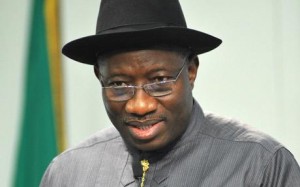 Goodluck Jonathan is at the moment in a tight spot. The past few months, the Nigerian president has been subjected to a fierce opposition amidst his very own party, The People's Democratic Party (PDP) which has been reigning since the establishment of the Fourth Republic in 1999. Leading a gigantic country in terms of economy and demography (Nigeria is the most populous country of Africa with 170 million inhabitants), President Jonathan has been in power since the death of his predecessor Umaru Yar’Adua in 2010 and is becoming more and more unpopular. In addition to a questionable management of the clashes with the Boko Haram sect, he is suffering from a considerable lack of legitimacy in his party.
Goodluck Jonathan is at the moment in a tight spot. The past few months, the Nigerian president has been subjected to a fierce opposition amidst his very own party, The People's Democratic Party (PDP) which has been reigning since the establishment of the Fourth Republic in 1999. Leading a gigantic country in terms of economy and demography (Nigeria is the most populous country of Africa with 170 million inhabitants), President Jonathan has been in power since the death of his predecessor Umaru Yar’Adua in 2010 and is becoming more and more unpopular. In addition to a questionable management of the clashes with the Boko Haram sect, he is suffering from a considerable lack of legitimacy in his party.
37 MP from PDP have joined the ranks of the opposition on last December 18th. This rebellion resulted in Jonathan losing his parliamentary majority, an unprecedented situation in Nigeria’s political history. Its consequences are unpredictable. On the one hand, it remains difficult to know how President Jonathan will govern without a majority at the Parliament; on the other hand the future is uncertain as to the presidential elections of 2015. This important setback is one more step leading to the mutiny firstly opened in September 2013 by six governors from the Muslim North who created the New PDP. The bone of the contention: the former President Olusegun Obasanjo made things worse when he stepped in the turmoil and wrote a scathing letter to his successor, accusing him of invigilating his political opponents along with hundreds of Nigerians using the State services. Even worse, police officers assaulted locals belonging to the same states as the mutinous governors, who consider those confrontations as bullying, and denounce dictatorial methods.
President Jonathan now finds himself in a very difficult situation, and the stake is the future of Nigeria, way beyond the future of PDP. Indeed, the present revolt against Jonathan is linked to the main political issue in Nigeria since the independence, namely the fragile and volatile balance between the Muslim North and the Christian South of the country. When PDP took power in 1999, the leaders of the party agreed on an informal sharing of the power: the president could only pretend to two consecutive terms (8 years) , the deal was that every two-term period of time, a Muslim president had to vacate the power for a Christian successor and vice versa. It was a tacit political alternation based on the religion and the region of the pretenders to the throne. Thus, after Obasanjo, a Yoruba from the South who reigned from 1999 to 2007, it was Umaru Yar’Adua (former governor of Katsina, a northern state) who took the lead. But his sudden death in 2010 jostled that subtle arrangement: Goodluck Jonathan, the vice-president from the South then became president; he was re-elected in 2011 and is now wanting to run for the elections of 2015. If he was to win the elections, he would govern until 2019, which means a presidential mandate of almost ten years. To put it bluntly, the power would have been to the North for only three years (2007-2010) on the twenty years of the PDP reign (1999-1919). It is merely unacceptable for most politicians from the North.
If Goodluck Jonathan maintains his authoritarianism, he takes the risk to worsen the bleeding of the PDP, which could lose the elections in 2015. However, it is still possible for him to limit the damages by winning back the militants, who have already started to leave the ship, and save the essential: the political unity of the party and the stability of Nigeria. The best he can do is not to run for a re-election in 2015.
We should pay careful attention to the political struggles going on in Nigeria because they have ethnic and religious overtones in addition to the economic stakes surrounding oil (Nigeria is the first African producer of oil). Goodluck Jonathan is facing a great social discontent since he took power in 2010. The increasing fuel prices rekindled the tensions between Muslims from the North and Christians from the South, tensions he failed to handle efficiently by the way.
The successive defection of the governors and parliamentarians who joined the APC (All Progressives Congress), the main opposition coalition, is a severe blow for President Jonathan. That is why he should pay great attention to the way he will handle this new situation while avoiding any measure of authoritarianism. He ought to win back those PDP leaders who joined the opposition and dispel any ambiguity on his potential candidature to the elections of 2015. The Boko Haram sore is way too crippling for Nigeria to enter a new cycle of violence. Especially if they come with ethnic and religious dimensions in a continent already scarred by that kind of conflicts.
Translated by Ndeye Mane SALL
